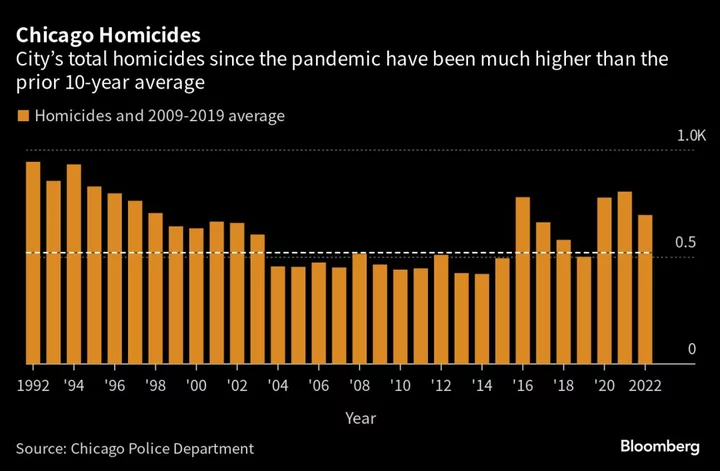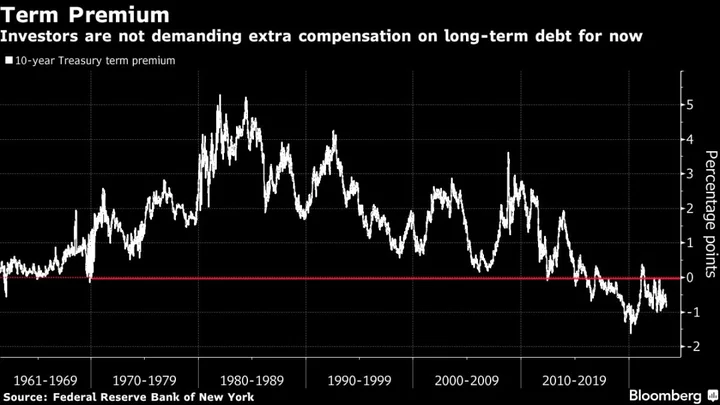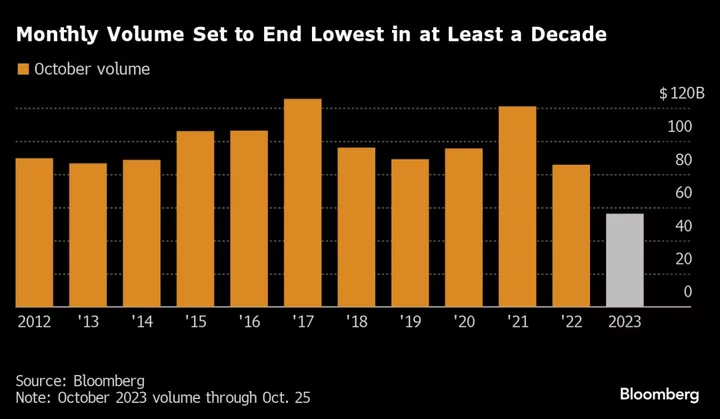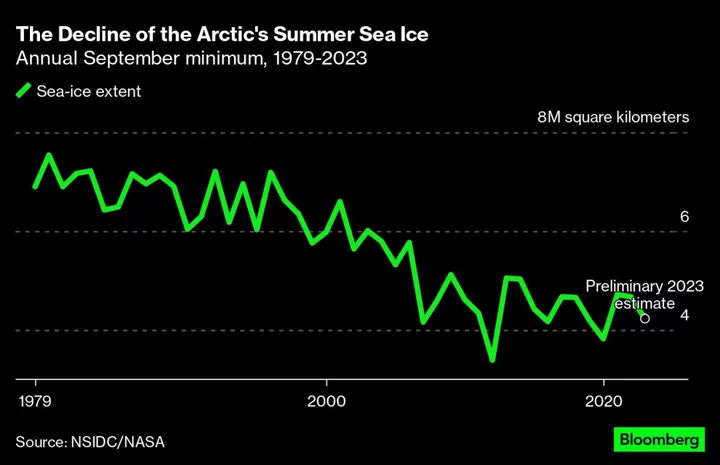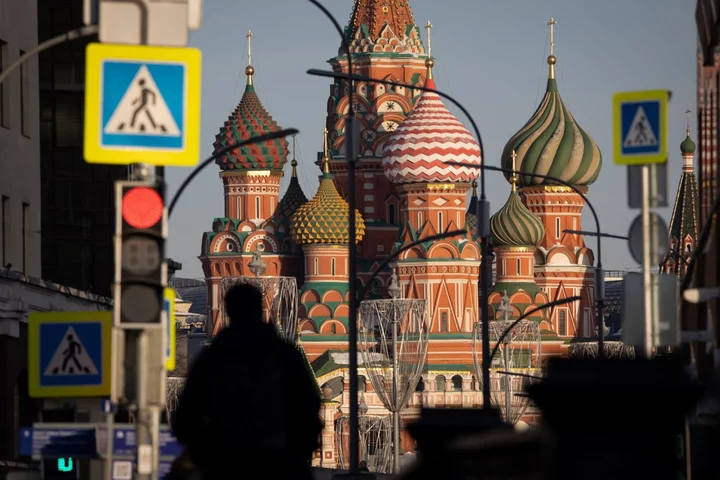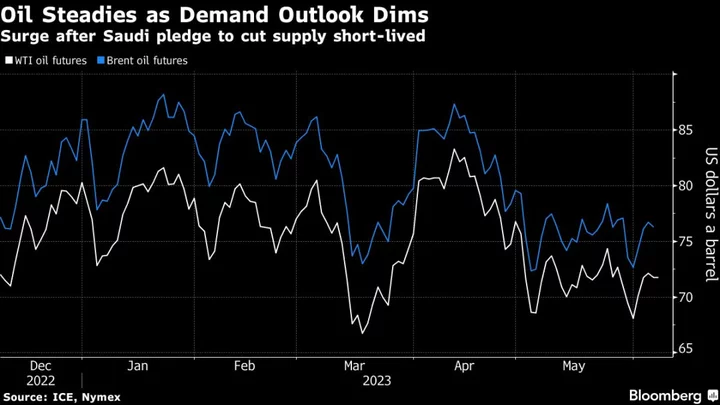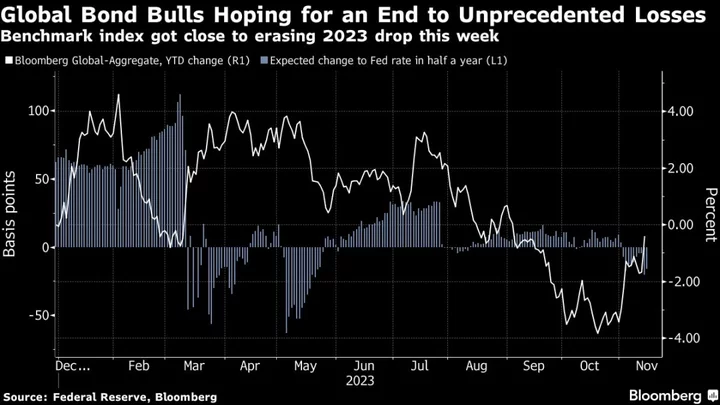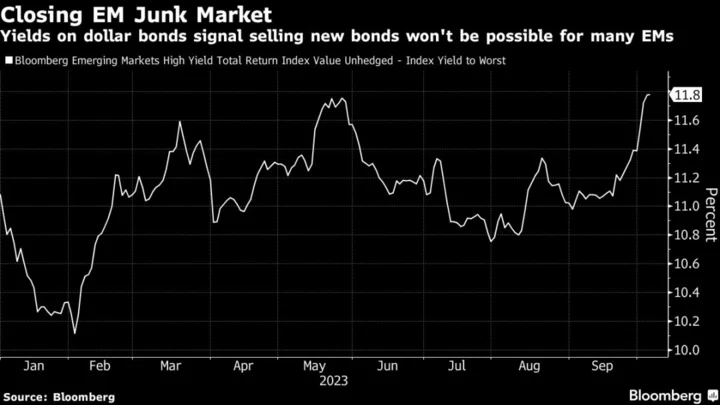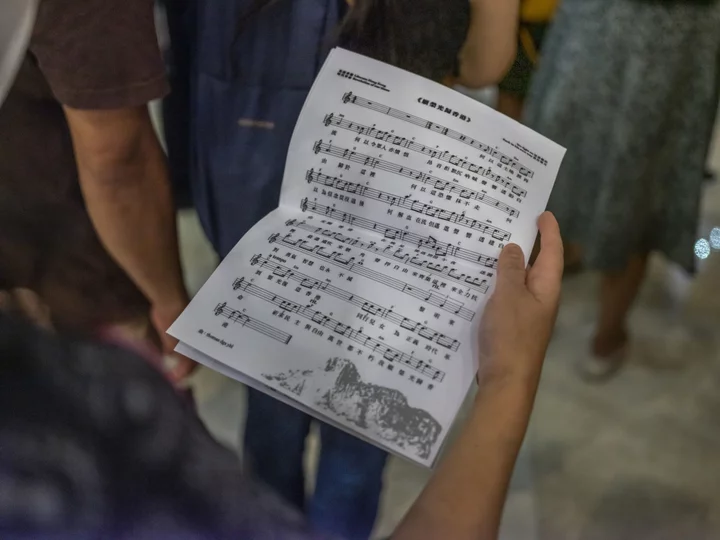Nascar is about to hit the road in Chicago for the first-ever street race in its marquee series.
For the city, the spectacle means plenty of hassle — and it’s likely to produce only limited payoff.
The event will send the US racing circuit’s stock cars screaming along a 2.2-mile (3.5-kilometer) course snaking through downtown streets, and is expected to draw 100,000 fans this weekend. The race at the iconic Grant Park at Lake Michigan’s waterfront will also push some $113.8 million into the local economy, according to Nascar projections.
Former Mayor Lori Lightfoot agreed to a three-year deal to bring Nascar to Chicago to help lure tourists back and accelerate the city’s recovery from the Covid-19 pandemic. The midwestern financial capital has been struggling with a sluggish economy and rising crime, along with the exit of high-profile businesses like Ken Griffin’s Citadel.
Instead, road closures ahead of the race have kept some people from going downtown, slowing down businesses and stifling the very area the event was intended to stimulate. And there are signs turnout could be lower than expected. Tickets for the event and hotel rooms near the course were still available Thursday, according to online searches.
Traffic around Grant Park has been snarled for the past month, creating headaches for nearby tourist attractions. The Museum Campus, a part of Grant Park that includes the Field Museum and the Shedd Aquarium, has said it expects to lose $3.5 million as a result of road closures and other disruptions tied to summer events including the Nascar race.
“It seems our parks have been sold out yet again for not a lot of return,” said Juanita Irizarry, executive director of the nonprofit Friends of the Park. “They’re banking on future tourism, but often that happens on the backs of everyday residents.”
Read more: Taylor Swift Helps Chicago Book Most Hotel Rooms on Record
Other big events have produced a greater return for the city without as much disruption.
The race weekend is expected to yield only about a third of the economic impact of the Lollapalooza music festival, which will take place at Grant Park in August this year. A recent series of Taylor Swift concerts at Soldier Field led to 88,000 hotel bookings over two nights, nearly four times more than the 24,000 bookings expected by Nascar fans, according to the race’s economic impact study.
Steering Clear
For Chicago, hosting a unique event for one of America’s most popular sports looked enticing. It offered the chance to show off the city’s landmarks to a national TV audience, and fight the perception that increasing crime made it an undesirable place to plan a trip.
Indeed, Chicago has struggled to shake off its post-Covid torpor. Hotel occupancy was just 66% in April, according to World Business Chicago, the city’s marketing arm. The number of visitors isn’t expected to regain pre-pandemic levels until 2025, according to Choose Chicago, a group focused on drawing industry conferences and tourists to the city.
Boosters say bringing Nascar to the Windy City will speed that recovery and create other benefits over time.
“Certainly hotels are part of it, but I think we really want to look at a larger picture — that is, selling Chicago,” said Lynn Osmond, Choose Chicago’s chief executive officer. “It’s really branding Chicago as a city of innovation and sports, excitement.”
Still, the Nascar deal, sealed last year by Lightfoot before her defeat at the polls, has divided Chicagoans. Bringing a race to the heart of downtown was questioned by several members of the city council, three of Chicago’s top museums and various community groups.
Some advocates have pushed for Lightfoot’s successor, Brandon Johnson, to look for ways to get out of hosting future races.
The mayor’s office didn’t immediately respond to a request for comment.
Global Aspiration
Ticket sales suggest visitors will be arriving to view the race from all 50 US states and 14 countries, said Julie Giese, president of Nascar’s Chicago course. Organizers are banking on British Formula 1 Champion Jenson Button and Shane Robert van Gisbergen, a driver from New Zealand, to attract the more global audience drawn to the flashy racing circuit.
Formula 1 has built a growing following in the US with races through cities including Austin and Miami, and the Chicago race will look more like those than the single-loop showdowns for which Nascar is best-known. The course will feature 12 turns to both the right and the left, and a section where the road shifts from four to two lanes. It’s the first street race in the 75-year history of the Nascar Cup Series.
Lisa Young, director of the school of hospitality leadership at DePaul University, said racing fans tend to have more money to spend than the younger crowd that flocks to Lollapalooza, and that Formula 1 enthusiasts are especially big spenders.
“For a lot of them money is no object,” she said.
At the moment, however, the city isn’t projecting a big increase in travelers. Traffic at O’Hare International Airport is expected to be down 1.7% from June 30 to July 5, compared with the same period last year, while passengers coming through the smaller Midway airport are set to rise 2.4%, the city said.
Nascar ticket prices in Chicago start at $269, multiple times more expensive than the cost of a triple-header event in August at the Indianapolis Motor Speedway. At the higher end, tickets for the President’s Paddock Club, an elevated luxury seating area with panoramic views of the Chicago race course, start at $3,015.
Yet, street closures tied to the race and other summer events are expected to cost the Shedd Aquarium, the Field Museum and the Adler Planetarium $3.575 million in lost revenue, the CEOS of the three nonprofit institutions told former Deputy Mayor Samir Mayekar in a letter last year. The Shedd plans to close for two days. The planetarium plans to remain open through the race weekend, while the Field Museum will have shorter hours.
“Large-scale events in Grant Park create a high unwillingness among museum and aquarium guests to visit,” the CEOs said, adding that some 19,000 people visit the Museum Campus on a typical summer Saturday, with more than half driving and 13% arriving by public transport.
Cumulative Effects
The convergence of the race with the Independence Day holiday has raised fear that crime could flare up. Over the Juneteenth holiday weekend, 75 people were shot and 13 killed in the city. Chicago has also been grappling with increased illegal drag racing — a problem that some worry the Nascar event could exacerbate.
At a press conference on Wednesday, Fred Waller, the interim superintendent of the Chicago Police Department, said there will be an increased police presence in the area and that officers’ regular days off have been canceled.
Noise and pollution are also concerns after two days of “very unhealthy” air quality due to smoke from wildfires in Canada. Jose Tirado, acting interim executive director of the Office of Emergency Management and Communications, said that the agency doesn’t expect an alert going into the weekend.
Meanwhile, an increased number of special events for paying crowds is making it harder for many Chicagoans to access city parks. Some green areas end up not reopening after events due to extensive damage, according to Friends of the Park.
“It really is on the Park District to think much more critically about these cumulative impacts,” said Alderman Daniel La Spata. “It adds up.”
(Corrects price comparison in the 22nd paragraph of story originally published on June 30.)

